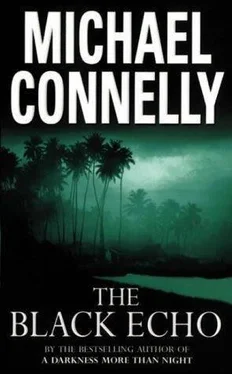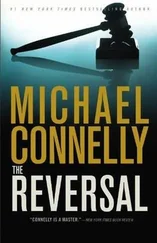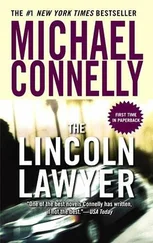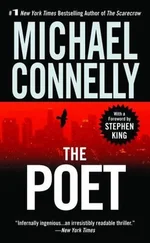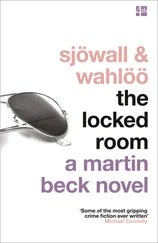Without a word they both piled into Bosch’s car through the passenger door. Bosch held his breath while he turned the key, but the engine started and the car squealed away from the curb. Bosch rocked the steering wheel from side to side as he picked up speed. The suspension felt a little loose. He had no idea what the extent of the damage was. When he tried to check the side-view mirror he saw it was gone. When he turned on the lights, only the passenger-side beam worked.
The hit-and-run car was at least five blocks ahead, near the crest where Ocean Park Boulevard rises and then drops from sight. The lights on the speeding car went out just as it dropped over the hill out of sight. He was heading for Bundy Drive, Bosch thought. From there a short jog to the 10. And from there he would be gone and they’d never catch him. Bosch grabbed the radio and called in an Officer Needs Assistance. But he could not provide a description of the car, only the direction of the chase.
“He’s going for the freeway, Harry,” Eleanor yelled. “Are you okay?”
“Yeah. Are you? Did you get a make?”
“I’m fine. Scared is all. No make. American, I think. Uh, square headlights. No color, just dark. I didn’t see the color. We won’t catch him if he makes the freeway.”
They were heading east on Ocean Park, parallel to the 10, which was about eight blocks to the north. They approached the top of the crest, and Bosch cut off the one working headlight. As they came over, he saw the unlit form of the hit-and-run car passing through the lighted intersection at Lincoln. Yeah, he was going for Bundy. At Lincoln, Bosch took a left and floored the gas pedal. He put the lights back on. And as the car’s speed increased there was a thumping sound. The front left tire and alignment were damaged.
“Where are you going?” Eleanor shouted.
“I’m going for the freeway first.”
Bosch had no sooner said that than the freeway entrance signs came up and the car made a wide, arcing right turn onto the ramp. The tire held up. They sped down the ramp into the traffic.
“How’ll we know?” Eleanor shouted. The noise from the tire was very loud now, almost a continual throbbing.
“I don’t know. Look for the square lights.”
In one minute they were coming up on the Bundy entrance, but Bosch had no idea whether they had beaten the other car or if it was already well ahead of them. A car was coming up the ramp and into the merging lane. The car was white and foreign.
“I don’t think so,” Eleanor called.
Bosch gunned it to the floor again and moved ahead. His heart was pounding almost as fast as the tire, half with the excitement of the chase, half with the excitement of still being alive and not broken on the street in front of Eleanor’s apartment. He was gripping the steering wheel at the ten and two o’clock positions, urging the car on as if he held the reins of a galloping horse. They were moving through sparse traffic at ninety miles an hour, both of them looking at the front ends of the cars they passed, searching for the four square lights or a damaged right side.
A half-minute later, Bosch’s knuckles as white as bones wrapped around the wheel, they came upon a maroon Ford going at least seventy in the slow lane. Bosch swung out from behind and passed alongside. Eleanor had her gun in her hands but was holding it below the window so it could not be seen from outside the car. The white male driver didn’t even look over or register notice. As they pulled ahead, Eleanor shouted, “Square lights, side by side.”
“Is it the car?” Bosch called back excitedly.
“I can’t-I don’t know. Can’t see the right side for damage. It could be. The guy isn’t showing anything.”
They were three-quarters of a car length ahead now. Bosch grabbed the portable pull-over light off the transmission hump on the floor and swung it out the window onto the roof. He switched on the revolving blue light and slowly began to angle the Ford onto the shoulder. Eleanor put her hand out the window and signaled the car over. The driver began to comply. Bosch braked sharply and let the other car shoot by onto the shoulder, then Bosch swung his car onto the shoulder behind it. When both had stopped alongside a sound barrier wall Bosch realized he had a big problem. He put on the high beams, but still only the passenger-side headlight responded. The car in front was too close to the wall for Bosch and Wish to see if the right side was damaged. Meantime, the driver sat in his car, mostly shrouded in darkness.
“Shit,” Bosch said. “Okay. Don’t come up till I say it’s clear, okay?”
“Got it,” she said.
Bosch had to throw his weight hard against the door to open it. He came out of the car, gun in one hand and flashlight in the other. He held the light out away from his body and trained its beam on the driver of the car ahead. The roar of passing traffic in his ears, Bosch started to shout, but a diesel horn drowned him out and a blast of wind from the passing semi shoved him forward. Bosch tried again, shouting for the driver to stick both hands out the side window where Bosch could see them. Nothing. Bosch shouted the order again. After a long moment, with Bosch poised off the left rear fender of the maroon car, the driver finally complied. Bosch ran the flash beam through the back window and saw no other occupants. He ran up and put the light on the driver and ordered him to step out slowly.
“What is this?” the man protested. He was small, with pale skin, reddish hair and a transparent mustache. He opened the car door and stepped out with his hands up. He was wearing a white button-down shirt and beige pants held up by suspenders. He looked out into the passing field of cars, almost as if beckoning for a witness to this commuter’s nightmare.
“Can I see a badge?” he stammered. Bosch rushed forward, spun him around and slammed his body into the side of his car, his head and shoulders over its roof. With one hand on the back of the man’s neck, holding him down, and the other holding the gun to his ear, Bosch shouted to Eleanor that it was clear.
“Check the front side.”
The man beneath Bosch let out a moaning sound, like a scared animal, and Bosch could feel him shaking. His neck felt clammy. Bosch never took his eyes off him to see where Eleanor was. Suddenly her voice was right behind him.
“Let him go,” she said. “It’s not him. There’s no damage. We’ve got the wrong car.”
FRIDAY, MAY 25
They were interviewed by the Santa Monica police, the California Highway Patrol, LAPD and the FBI. A DUI unit had been called to give Bosch a sobriety test. He passed. And by 2A.M. he sat in an interview room at the West Los Angeles bureau, bone-tired and wondering if the Coast Guard or IRS would be next. He and Eleanor had been separated and he hadn’t seen her since they had arrived three hours earlier. It bothered him that he could not be with her to protect her from the interrogators. Lieutenant Harvey “Ninety-eight” Pounds came into the room then and told Bosch they were finished for the night. Bosch could tell that Ninety-eight was angry, and it wasn’t just because he had been rousted from home.
“What kind of cop doesn’t get the make of the car that tries to run him down?” he asked.
Bosch was used to the second-guessing tone to the questions. It had been that way all night.
“Like I told every one of those guys before you, I was a little busy at the time. I was trying to save my ass.”
“And this guy you pull over,” Pounds cut in. “Jesus, Bosch, you rough him up on the side of the freeway. Every asshole with a car phone is dialing nine one one reporting kidnap, murder, who knows what else. Couldn’t you have tried to get a look at the right side of his car before you pulled him over?”
Читать дальше
